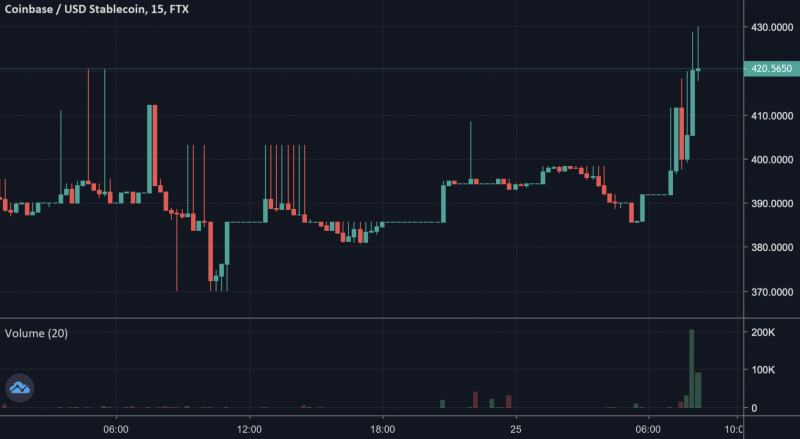The S-1 filing of crypto exchange Coinbase was published on Thursday, revealing an unprecedented degree of detail about the U.S.-based firm’s financials.
Included in the S-1 are new details about Coinbase’s notable acquisitions, including brokerage startup Tagomi, the controversial intelligence company Neutrino, and part of Xapo.
As might be expected, the deals employed a mix of cash as well as Coinbase stock issuances. In these cases reported below, the acquired companies were folded into Coinbase’s broader operations, adding new capabilities that it now leverages today as it prepares for its direct listing on the Nasdaq exchange.
Tagomi
Coinbase formally threw its hat into the crypto prime broker race with its acquisition of Tagomi last May, as reported at the time by The Block.
Per the filing, Tagomi was valued at $77.2 million, including $22.5 million in goodwill consideration. Per Coinbase, that figure “is primarily attributed to the market presence, synergies, and the use of purchased technology to develop future products and technologies.”
Notably, Coinbase valued Tagomi’s technology at $6.6 million and its customer relationships and licenses at $400,000 and $350,000, respectively.
Ultimately, Coinbase paid $41.79 million for Tagomi, including $30.5 million in common stock, $760,000 in replacements of options and warrants and $1.9 million in cash. The consideration also included $8.53 million for “settlement of pre-existing receivable.”
At the time of the transaction, Tagomi possessed liabilities of $35.4 million, much of it in the form of custodial funds due to customers.
Neutrino
Coinbase sparked controversy when it purchased Neutrino in 2019, which it later repurposed as a branded blockchain analytics firm. As The Block reported last year, Coinbase sought business with the U.S. government via its analytics arm.
Per the S-1, Coinbase paid $6.4 million in cash for Neutrino. Additionally, “the Company also paid cash of $7.4 million into an escrow fund, to be distributed to the former stockholders of Neutrino over a four-year period.”
However, that plan shifted amid the furor over the Neutrino purchase.
“During March 2019, a decision was made to separate with certain Neutrino employees. As part of their separation agreement, the full amount held in the escrow fund of $7.4 million was released and included in technology and development in the consolidated statements of operations.” Coinbase said in the filing.
Elsewhere in the filing, Coinbase acknowledged the damage done by way of the Neutrino acquisition, noting:
“…in February 2019, we announced the acquisition of Neutrino S.r.l., a blockchain intelligence platform, whose founders were directly affiliated with the software firm the Hacking Team, which purportedly sold software with surveillance capabilities to governments with authoritarian regimes, resulting in reputational harm to our business, a loss of customers, and increased cost.”
Xapo
Xapo’s institutional service was obtained by Coinbase in the summer of 2019, as previously reported. At the time, Coinbase said that it followed “a tremendous period of growth and innovation for Coinbase Custody.”
Per the S-1, the deal constituted a mix of cash and a contingent stock consideration:
“The purchase consideration was comprised of cash and contingent stock consideration, which would be issued to the seller if certain conditions were met on the anniversary of the transaction. This contingent consideration was accounted for as a liability measured at fair value, with subsequent changes in fair value being recognized in net income or loss. The total purchase consideration was $68.3 million, comprised of cash of $55.0 million, contingent consideration of $12.9 million, and direct acquisition costs of $0.4 million.”
In its accounting figures, Coinbase said that what it acquired were “customer relationships” as well as a “non-compete agreement.”
The contingent consideration was settled last August “by issuing 690,756 shares of common stock,” per the filing.
Bison Trails
Last month, Coinbase announced that it acquired Bison Trails, an infrastructure provider in the crypto space. Coinbase was a previous investor in the startup.
Per the filing, the acquisition was completed on February 8, and the document itself contains little information about how Bison Trails was valued or the nature of the transaction.
“The initial accounting for the business combination was incomplete at the time the financial statements were issued. The fair value of the total consideration transferred, as well as the acquired assets and liabilities was still being determined. As such, the disclosure of these amounts could not be made.”
© 2021 The Block Crypto, Inc. All Rights Reserved. This article is provided for informational purposes only. It is not offered or intended to be used as legal, tax, investment, financial, or other advice.


